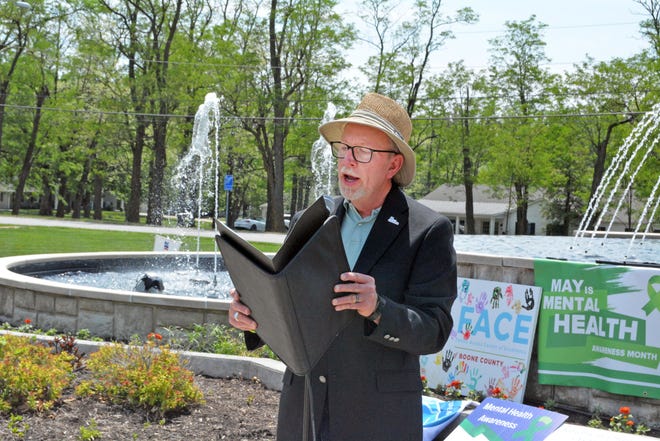An apartment redevelopment proposed for a strip mall on Columbia Pike is stalled for the foreseeable future after the anchor tenant — a grocery store — fell through.
But some of the existing tenants, including the restaurant Atilla’s, have already moved out. And now, the Fillmore Gardens shopping center on the 2600 block of the Pike, which includes a still-operating CVS, is attracting graffiti artists and other signs of blight, according to neighbors.
Penrose Civic Association President Alex Sakes says the development was “slated to become a new crown jewel” but is now “an unbelievable embarrassment.”
“The never ending graffiti and garbage is truly appalling and gets worse by the day,” he said. “My residents and I don’t just work here or drive past this site — we live here. We take great pride in our neighborhood and are happy to step up to help beautify this site once again. I’m not here to point fingers or place blame, but the condition of this site cannot and will not continue to perpetuate.”
The Arlington County Board approved the plans to build a a 247-unit apartment complex with a ground-floor grocery store, rumored to be an Amazon Fresh, in March of 2022. Some tenants have already moved out, anticipating the project starting in late 2022 or early 2023.
Progress halted in late December, however, when the grocery store tenant told the developer it would not be moving in. Without a major tenant guaranteed for the space, the developer — Insight Property Group — could not borrow the money it needed to proceed with the project, Insight’s Sarah Davidson told the Penrose Civic Association earlier this month.
She confirmed that an unnamed retailer pulled out of the space with ARLnow, adding that “economic conditions will determine a revised project timeline.”
The grocery tenant, Davidson said in the civic association meeting, told Insight “they were pulling out of a significant number of pipeline deals, of which this was one.”
That sounds quite similar to what is happening with Amazon Fresh: across the country, proposed locations of the tech company’s grocery store are falling through, with at least one ending in a lawsuit against Amazon.
For Sakes, watching the shopping center struggle is a “worst-case scenario” for “once a thriving hub for diverse, Black and Brown-owned small businesses, including Atilla’s, Salsa Room, Legend Kicks, and more.”
Graffiti keeps popping up. Some drawings found on Monday were apparently scrubbed off only for markings to return today (Tuesday). Davidson says they’re trying to stay on top of it.
“The property owners are committed to keeping the property in clean and presentable condition,” she said.
Insight is also trying to crowdsource ideas for how to fill the storefronts for the next few years, until redevelopment plans can be revived.
“We would love to offer pop-up space for some of the local artist communities, provide space for activities that might be supplementary to CPP’s initiatives, and business incubators as well as find ways to activate some of our parking areas,” Davidson said. “Currently, we feel fortunate to have CVS and Burrito Bros who remain as tenants of the Center.”
The company has talked with Arlington Economic Development, the Columbia Pike Partnership, various arts groups, Atilla’s and the County Board, Davidson told Penrose residents, listing other ideas like murals and food trucks. Meanwhile, an off-duty officer who lives nearby walks the site regularly, particularly in the evenings.
Others commented on the need for temporary tenants on social media, though there was skepticism about whether that would work out.
“It’s a shame, almost like we just had a [local] brewery desperately trying to find vacant space in the county,” said one Penrose resident on Twitter, referencing the unsuccessful attempt by New District Brewery to find a new home after it could not renew its lease in Green Valley.
Hearing from multiple folks that the Elliott project on Columbia Pike (https://t.co/pdK6LR4ZYl) is on hold. If true, the property owner should at least ensure that the vacant buildings are secured in the meantime and possibly consider short term rentals to local biz.
— Eric Berkey (@berkeyeric) May 23, 2023
the challenge will be in attracting retail tenants in the interim – who would want to build a temporary business that will be leveled once interest rates come back down in a few years? the land owners will have to offer cheap rent
— Tim Dellinger (@timdellinger) May 21, 2023
Sakes says this outcome “all to frequent” for proposed redevelopments along Columbia Pike. For instance, ARLnow reported in December that another approved residential development at the Rappahannock Coffee site on Columbia Pike was on hold.
“I would love to see the space cleaned up and open to small businesses, food trucks, local artists and non-profits who can utilize this space to give back to the community,” Sakes said. “Absolutely anything would be better than our current state of affairs.”







